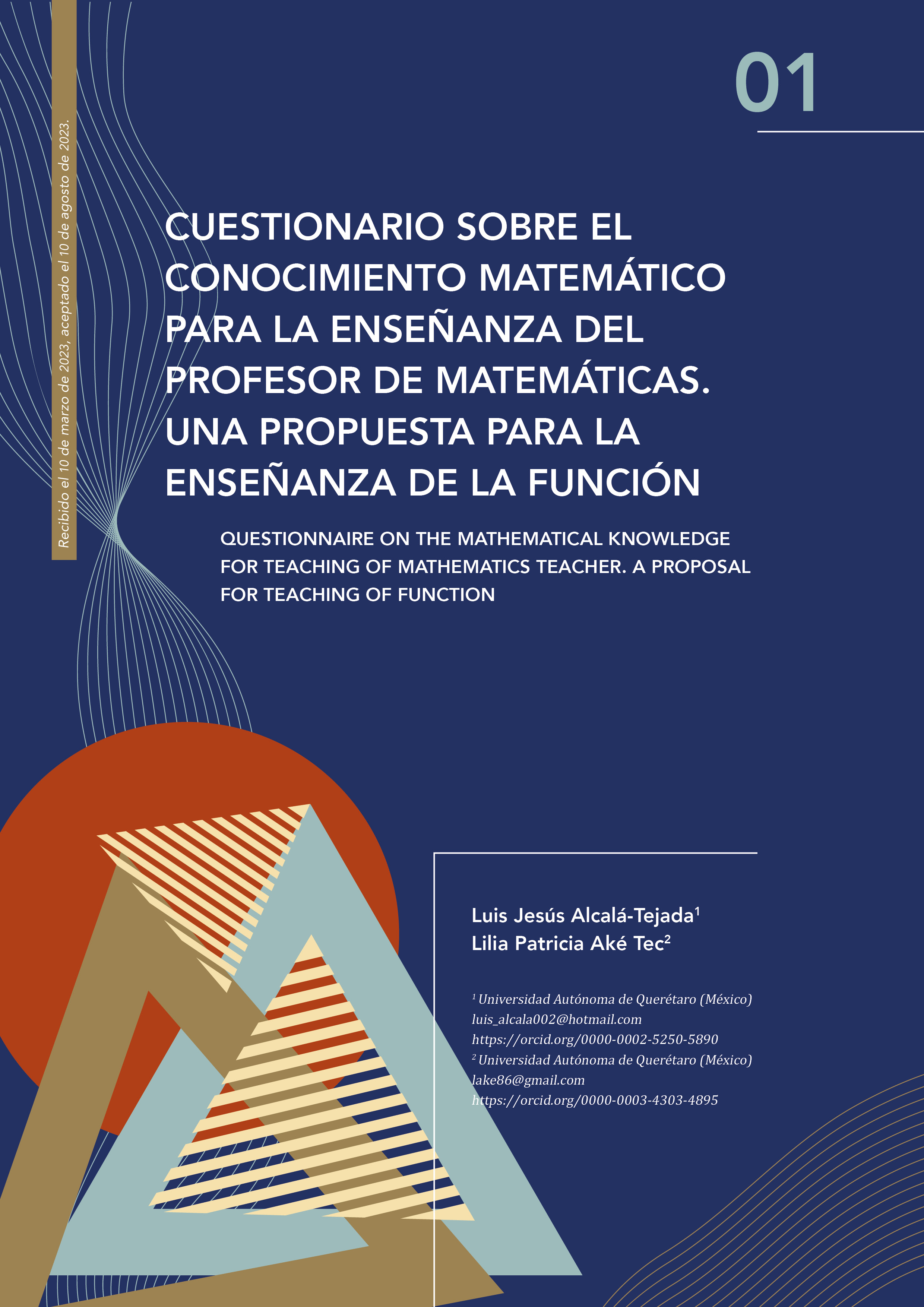Abstract
The present study is about a questionnaire to assess mathematical knowledge for teaching of mathematics teachers about the concept of polynomial function. A qualitative methodology based on design is used, based on three elements: the mathematical knowledge for teaching, the semiotic representation registers and function meanings. This study is situated in the context of high school mathematics teachers because, according to research, there isn’t a homogeneous professional training, as well as insufficient specific knowledge for the teaching profession at this educational level. In this way, the design of a questionnaire is presented, which is composed of six task that unify teaching knowledge, representation registers and function meanings. Finally, this type of proposal becomes a tool that characterizes the necessary knowledge for the function concept teaching. In addition, this proposal serves as a reference to strengthen teacher training activities to improve their educational practices.
References
Aguilar, A., Carreño, E., Carrillo, J., Climent, N., Contreras, L., Escudero, D., Flores, E., Flores, P., Montes, M. y Rojas, N. (2014). El conocimiento especializado del profesor de Matemáticas: MTSK. En CIBEM (Eds.). Actas de las VII CIBEM (pp. 5063-5069). Aguilar, S. y Barroso, J. (2015). La triangulación de datos como estrategia en investigación educativa. Revista de Medios y Educación, (47),73-88. https://doi.org/ 10.12795/pixelbit.2015.i47.05
Amaya, T., Castellanos, G. y Pino-Fan, L. (2021). Competencias de los profesores de matemáticas en formación a la hora de transformar las representaciones de una función. Uniciencia, 35 (2), 1-15. https://doi.org/10.15359/ru.35-2.12
Artigue, M. (2004). Problemas y desafíos en Educación Matemática: ¿Qué nos ofrece hoy la didáctica de las matemáticas para afrontarlo? Educación Matemática, 16(3), 5-28. http://www.redalyc.org/articulo.oa?id=40516302
Ávila, A. (2016). La investigación en educación matemática en México: una mirada a 40 años de trabajo. Educación Matemática, 28(3), 31-59. https://doi.org/10.24844/EM2803.02
Azcárate, C. y Deulofeu, J. (1996). Funciones y Gráficas. Editorial Síntesis.
Ball, D., Thames, M. y Phelps, G. (2008). Content knowledge for teaching. What makes it special? Journal of Teacher Education, 59(5), 389-407. https://doi.org/10.1177/0022487108324554
Burgos, M., Beltrán-Pellicer, P., Giacomone, B. y Godino, J. D. (2018). Conocimientos y competencia de futuros profesores de matemáticas en tareas de proporcionalidad. Educação e Pesquisa, 44, 1-22.
Camarena, P. (2015). Educación matemática en México: investigación y práctica docente. En X. Martínez, y P. Camarena (Eds.), Educación Matemática en el Siglo XXI (pp. 191-216). Instituto Politécnico Nacional
Castro, W.F. y Pino-Fan, L. (2021). Comparing the didactic-mathematical knowledge on the derivative of in-service and preservice teachers. Acta Scientiae, 23(3), 34-99.
De la Rosa, A. (2003). Errores e inconsistencias en la enseñanza del concepto de función en el docente: el grado de visualización. Mosaicos Matemáticos, 11, 121-133.
Duval, R. (1993). Registres de représentations sémiotique et fonctionnement cognitif de la pensée. Annales de Didactique et de Sciences Cognitives, 5, 37-65.
Duval, R. (2004). Semiosis y pensamiento humano. (M. Vega, Trad.) Cali, Colombia: Universidad del Valle, Instituto de Educación y Pedagogía, Grupo de Educación Matemática.
Duval, R. (2006). Un tema crucial en la educación matemática: la habilidad para cambiar el registro de representación. Gaceta de la Real Sociedad Matemática Española, 9(1). http://eudml.org/doc/44160
Espinoza, R. F. y Pochulu, M. D. (2020). Diseño de un instrumento para valorar la comprensión alcanzada en divisibilidad por futuros profesores de matemática. Bolema, 34 (66), 294-313.
García, F. (2019). Introducción al diseño de tareas en educación matemática: Una diversidad de marcos teóricos. Avances de Investigación en Educación Matemática, 15, 1-4. https://doi.org/10.35763/aiem.v0i15.264
Gavilán, J. (2006). El papel del profesor en la enseñanza de la derivada. Análisis desde una perspectiva cognitiva. Educación Matemática,18(2),167-170. https://www.redalyc.org/articulo.oa?id=40558507008
Graciano-Barragán, J. y Aké, L. (2021). Conocimiento de profesores de matemáticas en formación sobre los productos notables. Uniciencia, 35(1), 90-107. http://dx.doi.org/10.15359/ru.35-1.6
Ibarrola, M. y Martínez, M. (2018). Conformación de una identidad docente entre profesionistas universitarios contratados por asignatura en el nivel medio superior. Sinéctica, 51(00008). https://doi.org/10.31391/s2007-7033(2018)0051-008
Jones, M. (2006). Demystifying functions: The historical and pedagogical difficulties of the concept of the function. Undergraduate Math Journal, 7(2), 1-20.
Martínez-Sierra, G., Valle-Zequeida, M., García-García, J. y Dolores-Flores, C. (2019). “Las matemáticas son para ser aplicadas”: Creencias matemáticas de profesores mexicanos de bachillerato. Educación Matemática, 31(1). https://doi.org/10.24844/em3101.04
Organización de las Naciones Unidas para la Educación, la Ciencia y la Cultura [UNESCO] (2012). Challenges in basic mathematics education. http://unesdoc.unesco.org/images/0019/001917/191776e.pdf
Pino-Fan, L. y Godino, J. D. (2015). Perspectiva ampliada del conocimiento didáctico – matemático del profesor. Paradigma, 36(1), 87– 109.
Pino-Fan, L., Parra-Urrea, Y. y Castro, W. (2019). Significados de la función pretendidos por el currículo de matemáticas chileno. Magis, Revista Internacional de Investigación en Educación, 11(23), 201-220. https://doi.org/10.11144/Javeriana.m11-23.sfpc
Ribeiro, A. y Cury, H. (2018). Álgebra para a formação do professor: Explorando os conceitos de equação e de função. Autêntica.
Rodríguez-Flores A., Picardo-Alfaro, M., Espinoza-González, J., Rojas-González, N. (2018). El conocimiento especializado de un profesor de matemáticas: un estudio de caso sobre la enseñanza de los conceptos básicos de función. UNICIENCIA, 32(1), 89-107. https://doi.org/10.15359/ru.32-1.6
Roque, T. (2012). História da matemática – Uma visão crítica, desfrezando mitos e lendas. Zahar.
Sánchez, M. (2011). A review of research trends in mathematics teacher education. PNA, 5(4), 129-145. https://doi.org/10.30827/pna.v5i4.6151
Sánchez-Santiesteban, J., Cruz, M., Cabrera, A. y Sigarreta, J. (2022). El significado del concepto de pendiente desde la perspectiva universitaria. Universidad y Sociedad, 14(4), 156-171. https://rus.ucf.edu.cu/index.php/rus/article/view/3032
Santibañez, L. (2007). Formación y actualización de maestros de secundaria en México. Revista Mexicana de Investigación Educativa. 12, 305-335.
Scheiner, T., Montes, M.A., Godino, J.D., Carrillo, J. y Pino-Fan, L.R. (2019) What makes mathematics teacher knowledge specialized? Offering alternative views. International Journal of Science and Mathematics Education, 17(1), 153-172. https://doi.org/10.1007/s10763-017-9859-6.
Sfard, A. (1991). On the Dual Nature of Mathematical Conceptions. Educational Studies in Mathematics, 22, 1-36. https://doi.org/10.1007/BF00302715
Shulman, L. S. (1986). Those Who Understand: Knowledge growth in Teaching. Educational Researcher, 15(2), 4-14. https://doi.org/10.3102/0013189X015002004
Tasdan, B. y Koyunkaya, M. (2017). Examination of pre-service mathematics teacher’s knowledge of teaching function concept. Acta Didactica Napocensia, 10(3), 1-18. https://doi.org/10.24193/adn.10.3.1
Vásquez, C. y Alsina, A. (2017). Aproximación al conocimiento común del contenido para enseñar probabilidad desde el modelo del Conocimiento Didáctico-matemático. Educación Matemática, 29(3), 79-108.

This work is licensed under a Creative Commons Attribution-NonCommercial-ShareAlike 4.0 International License.
Copyright (c) 2024 PädiUAQ


